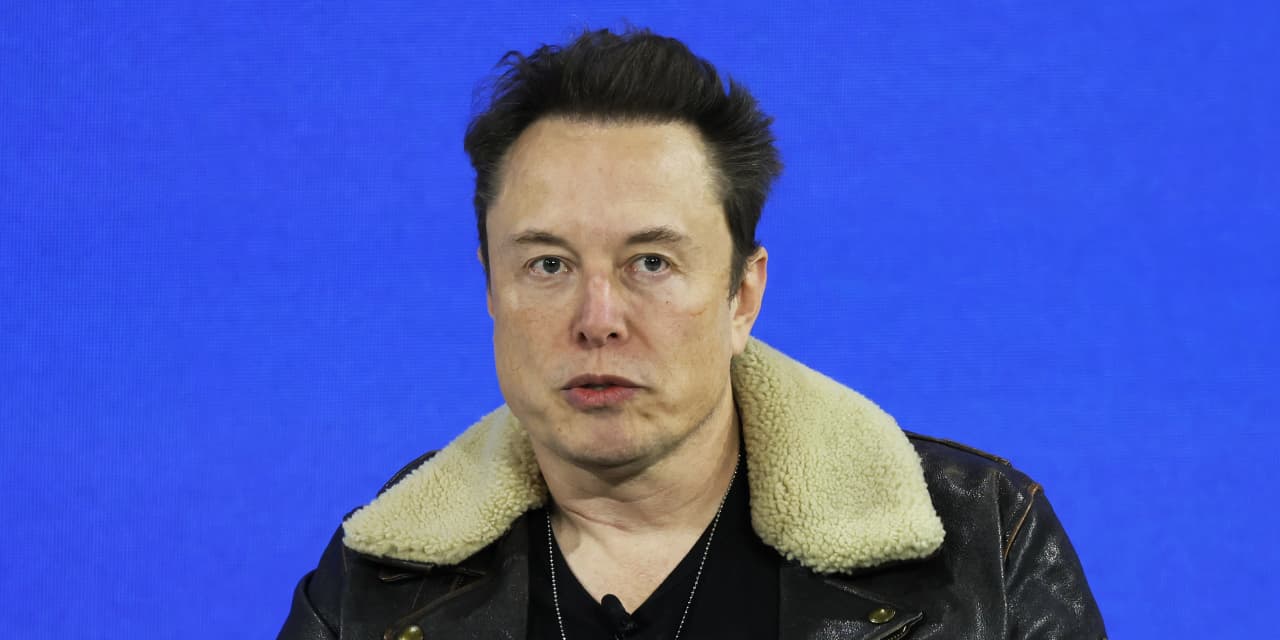Elon Musk was combative as ever in a lengthy interview on Wednesday, but still backed away from his controversial endorsement of a tweet that Jewish groups and the White House called anti-Semitic.
“I am quite sorry,” the owner of X, formerly Twitter, said at the New York Times 2023 DealBook Summit in New York. “I should in retrospect not have replied to that particular post.”
Musk was at times apologetic and at times aggressive during the interview which dealt in large matter with the controversy that has swirled around him since he backed a claim that Jewish communities are pushing hatred against white people in a series of posts on his social media platform.
A number of companies suspended advertisements on X after Musk made his comments two weeks ago. Musk had some choice words for advertisers. “If somebody is going to try to blackmail me with advertising, go f— yourself, go f— yourself, is that clear?” he said. “Don’t advertise.”
Musk said that his trip to Israel earlier this week “wasn’t an apology tour” and that it was planned before he made the controversial remarks.
He also said he has “no problem being hated” and that “it’s a real weakness to want to be liked.”
“Hate me, like me, or indifferent, do you want the best car or do you not want the best car,” he said Wednesday evening.
Musk’s issues began after an X user who goes by the name “The Artist Formerly Known as Eric” wrote, in part: “Jewish communities have been pushing the exact kind of dialectical hatred against whites that they claim to want people to stop using against them.”
Musk responded on X: “You have said the actual truth.” The response drew condemnation from the Anti-Defamation League and the White House, which characterized the post as anti-Semitic.
Separately, a Nov. 16 research report from progressive media-monitoring nonprofit Media Matters showed how often advertiser content appeared “beside neo-Nazi and white nationalist fringe content” on X.
Apple,
Walt Disney,
and several other large companies suspended advertising on the social media platform. Speaking at the DealBook Summit earlier Wednesday, Disney CEO Bob Iger said that he “felt that the association with that position and Elon Musk and X was not necessarily a positive one for us.” The CEO added that he hasn’t addressed whether advertising will restart on the platform.
Apple didn’t immediately respond to a request for comment on whether it would restart advertising on X.
Musk has defended himself against claims of anti-Semitism in posts on X, saying on Nov. 18: “Nothing could be further from the truth. I wish only the best for humanity and a prosperous and exciting future for all.”
X also filed a lawsuit against Media Matters on Nov. 20 alleging its research methods skewed results. The company is seeking damages and the removal of the article.
Media Matters called the lawsuit “frivolous.”
Musk traveled to Israel on Nov. 27 to meet with Israeli Prime Minister Benjamin Netanyahu and President Yitzhak Herzog, as well as with families whose loved ones were kidnapped by the terrorist group Hamas.
“I appreciate the fact that Elon Musk came to Israel to see for himself,” said Herzog, speaking at the DealBook Summit earlier Wednesday. “I raised immediately our fear and criticism about the issue of antisemitism…it was a very open and frank discussion.”
Musk has owned X for a little over a year. While shares aren’t publicly traded, the comments have drawn attention from Wall Street and sparked calls for the board of Tesla, Musk’s public electric-vehicle company, to censure him.
Musk brushed aside the idea that his X activity could hurt Tesla or his space company SpaceX. He says people will buy the best cars available and that Tesla makes the best cars, adding that SpaceX’s record speaks for itself. The company pioneered reusable rockets and now dominates launch services. SpaceX will launch about 80% of the mass to reach orbit in 2023. It has little competition, including from government agencies.
There is another potential indirect impact on Tesla stock. A loss of advertising revenue could trigger Musk to sell some of his stake in Tesla to boost cash flow at his social media platform.
Large stock sales from a CEO can impact a company’s stock, and Tesla is no exception. Musk sold billions of dollars of Tesla stock throughout 2022 to help fund his purchase of X. From the time he tweeted, “I made an offer,” for Twitter on April 14, 2022, until he said he was done selling stock in late December 2022, Tesla shares fell more than 60%.
Stocks in general fell over that period: The
Nasdaq Composite
was off more than 20%.
Musk did say at one point that a loss of advertising revenue can, effectively, bankrupt X. That could indicate that he doesn’t plan to fund losses forever.
Tesla stock was trading around $243 before the Nov. 15 comments. Shares dipped initially but have since recovered, closing at $244.14 on Wednesday. The stock is up 0.9% in premarket trading Thursday.
Tesla is scheduled to unveil its highly anticipated Cybertruck on Thursday. Musk called it the most significant product launched in the world this year during the interview.
Write to Al Root at [email protected]
Read the full article here




